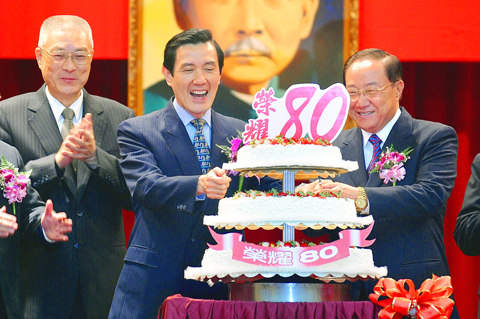President Ma Ying-jeou (馬英九) yesterday said he had asked government agencies to make the economic cooperation framework agreement (ECFA) negotiation process as transparent as possible to ease public concern over the pact.
Ma said that as official negotiations are scheduled to begin sometime this month, he made the request to make as much information as possible available as long as this does not hamper the progress of negotiations. The administration intends to sign the pact with Beijing in May.
Government agencies must explain the pact not only to businesses benefiting from an ECFA, but also to those who will be hard-hit and propose remedies for any problems, he said.

PHOTO: LIAO CHEN-HUEI, TAIPEI TIMES
Ma said that although the government began promoting the proposed accord last year, the public had not obtained sufficient information about it and therefore had some “misunderstandings.”
“If we use this approach to keep pushing, we can reduce doubts among the people,” he said. “I hope this will become part of the training program of civil servants so they can do a good job promoting government policies before we officially launch them.”
Ma made the remarks while addressing a tea party to celebrate the 80th anniversary of the Examination Yuan yesterday morning.
Others in attendance included Premier Wu Den-yih (吳敦義), Examination Yuan President John Kuan (關中) and former Examination Yuan presidents Yao Chia-wen (姚嘉文), Hsu Shui-teh (許水德) and Chiu Chuang-huan (邱創煥).
Ma said recently that some government polices had not won the support of the public because most people did not understand them well enough.
“There must be reforms that are so concrete and grand that the people can feel it,” he said.
Using the example of award-winning Taiwanese film No Puedo Vivir Sin Ti (不能沒有你), Ma encouraged civil servants to refrain from clashing with people simply because certain laws and regulations were outdated.
Civil servants could do their best to create some leeway within the realms of the law and minimize possible damage, he said.
“Civil servants might not be able to do their job perfectly, but they can compare their feelings with others,” he said. “Some people might still be unsatisfied, but they might find it acceptable.”

Three Taiwanese airlines have prohibited passengers from packing Bluetooth earbuds and their charger cases in checked luggage. EVA Air and Uni Air said that Bluetooth earbuds and charger cases are categorized as portable electronic devices, which should be switched off if they are placed in checked luggage based on international aviation safety regulations. They must not be in standby or sleep mode. However, as charging would continue when earbuds are placed in the charger cases, which would contravene international aviation regulations, their cases must be carried as hand luggage, they said. Tigerair Taiwan said that earbud charger cases are equipped

Foreign travelers entering Taiwan on a short layover via Taiwan Taoyuan International Airport are receiving NT$600 gift vouchers from yesterday, the Tourism Administration said, adding that it hopes the incentive would boost tourism consumption at the airport. The program, which allows travelers holding non-Taiwan passports who enter the country during a layover of up to 24 hours to claim a voucher, aims to promote attractions at the airport, the agency said in a statement on Friday. To participate, travelers must sign up on the campaign Web site, the agency said. They can then present their passport and boarding pass for their connecting international

UNILATERAL MOVES: Officials have raised concerns that Beijing could try to exert economic control over Kinmen in a key development plan next year The Civil Aviation Administration (CAA) yesterday said that China has so far failed to provide any information about a new airport expected to open next year that is less than 10km from a Taiwanese airport, raising flight safety concerns. Xiamen Xiangan International Airport is only about 3km at its closest point from the islands in Kinmen County — the scene of on-off fighting during the Cold War — and construction work can be seen and heard clearly from the Taiwan side. In a written statement sent to Reuters, the CAA said that airports close to each other need detailed advanced

The age requirement for commercial pilots and airline transport pilots is to be lowered by two years, to 18 and 21 years respectively, to expand the pool of pilots in accordance with international standards, the Ministry of Transportation and Communications announced today. The changes are part of amendments to articles 93, 119 and 121 of the Regulations Governing Licenses and Ratings for Airmen (航空人員檢定給證管理規則). The amendments take into account age requirements for aviation personnel certification in the Convention on International Civil Aviation and EU’s aviation safety regulations, as well as the practical needs of managing aviation personnel licensing, the ministry said. The ministry